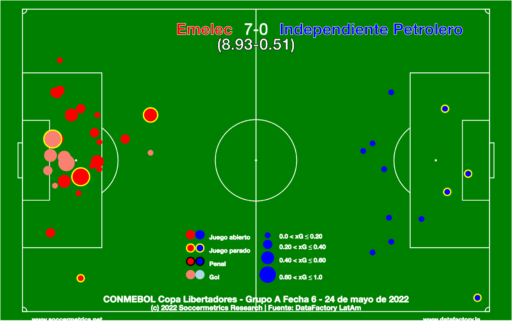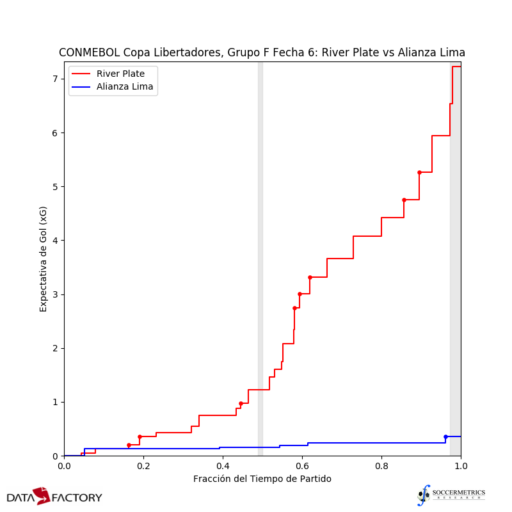Copa Libertadores 2022: Group Stage Review
Categories: Competition Analysis
It’s been a while since I’ve written one of these posts! But I hope to write more of them in the near future.
This year’s edition of the CONMEBOL Copa Libertadores has felt more like a “normal” tournament from the pre-Covid era. Covid is still around, of course, but the fans have returned (for better or worse) and the matches of the preliminary and group phases were conducted with few disruptions. At the end of the group stage, the trends that we’ve seen in previous competitions have remained. The Brazilian and Argentine clubs have dominated almost totally with a few clubs from mid-tier South American leagues and then the clubs from Peru, Chile, and Bolivia lagging well behind.
Here’s the list of the sixteen teams that have advanced to the knockout phase:
| Flamengo (BRA) | Vélez Sarsfield (ECU) | Atlético Mineiro (BRA) | Colón (ARG) |
| Emelec (ECU) | Athletico Paranaense (BRA) | River Plate (ARG) | Cerro Porteño (PAR) |
| Palmeiras (BRA) | Tolima (COL) | Fortaleza (BRA) | Talleres (ARG) |
| Estudiantes (ARG) | Corinthians (BRA) | Boca Juniors (ARG) | Libertad (PAR) |
The following eight teams that finished third in their groups passed down to the knockout stages of the Copa Sudamericana:
| Deportivo Táchira (VEN) | The Strongest (BOL) | Nacional (URU) | Independiente del Valle (ECU) |
| Deportivo Cali (COL) | Colo Colo (CHI) | Olimpia (PAR) | Universidad Católica (CHI) |
Turnover of the teams in the Libertadores knockout stage remained high. Six of the sides that advanced to the last 16 in the 2020 competition advanced to the last 16 in 2021; seven of those sides that advanced out of group stage in 2021 repeated the feat in 2022. By comparison, the UEFA Champions League tends to see significantly less turnover. Between the 2019-20 to 2020-21 seasons, eleven of the sixteen knockout sides were identical. But in the just completed 2021-22 competition, just eight of the clubs that advanced to the last 16 in 2020-21 were present the following season.
Over the last five seasons, the outcomes of group stage matches broke down accordingly:
| Season | Home Win | Draw | Away Win |
| 2022 | 48 | 25 | 23 |
| 2021 | 48 | 24 | 24 |
| 2020 | 51 | 13 | 32 |
| 2019 | 51 | 21 | 24 |
| 2018 | 46 | 25 | 25 |
From these statistics, the most visible impact of the closed door matches in the 2020 Copa Libertadores was significantly fewer draws and a significantly higher amount of away wins. It speaks perhaps to the impact of the home audience on the actions of the two teams and the referees. These impacts could have multiple explanations or no explanation, of course.
So let’s turn to the performance of the individual teams. What are the takeaways from the group stage?
Palmeiras and River Plate dominance. These two teams had the most dominant records over the group stage. Along with Flamengo, they were the only teams that finished the group stage unbeaten, but only Palmeiras achieved a perfect record. Both clubs took over 100 shots in the six matches, generated more xG/90, scored more goals, and converted scoring chances at a higher rate than any other side. They were also strong defensively: River allowed the fewest shots of all teams that had played more than six matches and the least xG/90 of all teams, and both sides allowed a scant three goals in the group stage. A meeting in the final is a possibility, but circumstances may make that event unlikely.
Young guns at Palmeiras and River. Julián Álvarez (River) and Rafael Navarro (Palmeiras) were the leading offensive players in the group phase with six and seven goals, respectively. It’s true that both scored the bulk of their goals in a single match — actually, Álvarez did score all six in a single match, while Navarro scored four — but they have generated more xG/90 than all but two players who have played more than 360 minutes. In fact, both players are the only ones who ranked among the top ten in xG/90 and xA/90. It will be a severe challenge for River or Palmeiras to keep their young talent. Álvarez will leave shortly for Manchester City, but Palmeiras look likely to hold to Navarro for the near future.
Ecuadorian disappointment. After the deep run of Barcelona in last year’s Libertadores, it was expected that Ecuadorian clubs might build on recent success in South American club competitions. This year’s performance was a disappointment, as the Ecuadorian Universidad Católica lost out to Bolivian opposition, Barcelona were knocked out by a penalty shootout in the final qualifying round, and Deportivo Tolima advanced at Independiente del Valle’s expense in the group stage. In the end, Emelec carried the Ecuadorian banner into the knockout phase, but they were a distant second to Palmeiras. The Electrics have some scoring talent such as Sebastián Rodríguez and Alejandro Cabeza, but they have a difficult Round of 16 draw against Atlético Mineiro.
Peruvian disaster. Anyone who saw Peru’s World Cup intercontinental playoff against Australia could see that the national team lacked strength in attacking and creating depth. Its domestic competition has lagged behind in creating talent capable of competing on the international stage. Neither of the two Peruvian representatives in the group stage won a match, and the teams scored an aggregate of seven goals while allowing 24. Peru was the only CONMEBOL nation to be completely knocked out of the continental competitions. Only one Alianza Lima or Sporting Cristal player ranked in the top 100 in either xG or xA (Christofer Gonzáles, 57th in xG). It was a disaster by any measure.
More lopsided results. This season’s group stage saw the continuation of lopsided results over the last three Libertadores seasons. Bolivia’s Independiente Petrolero were uncompetitive in Group A, having let in at least three goals in their four losses and at least seven goals in two of them. If one looks at the expected goal map for those lopsided results, one will find that yes, the result deserved to be that bad:

Alianza Lima had not suffered heavy defeats in the group stage; up to their match against River their worst result was 0-2 to Fortaleza. River were comfortably in front by halftime, but the second half was embarrassing to Alianza:

Perhaps the Alianza Lima is an atypical result, but Independiente Petrolero’s campaign evokes memories of Deportivo Binacional from 2020, and Deportivo San José the year before that. The number of slots per CONMEBOL nation has remained fixed for several years, but perhaps team performance should have more influence on berth allocation than it has in the past.

